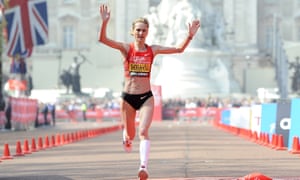The whistleblower who sparked the global investigation into corruption involving senior figures in the IAAF and Russian Athletics has called for the authorities to turn the spotlight on doping in other countries, particularly Kenya and Ethiopia.
Andrey Baranov, the Russian sports agent who wrote a signed deposition to the IAAF in April 2014 detailing bribery and extortion at the highest levels of the sport – long before the subsequent ARD documentary – said it was unfair that thefocus was only on his own country.
“It is wrong just to be focusing on Russia,” he said. “There should be a similar investigation into countries like Kenya and Ethiopia too. Their top athletes are earning far more than the Russians. Yet their levels of testing are very limited.”
While Russia’s athletes are facing suspension from international competition, Baranov believes the country should be given the chance to reform itself first. “I agree 100% with Wada [World Anti-Doping Agency]that things have to change,” he said.
“But Russia has a new president of the federation and a new head coach. They are doing their best to clean up the sport. Maybe it is not as fast as some would like but new and ambitious people are in positions of power.”
Baranov also insisted there is a double standard, with people wanting to punish Russia harshly yet not applying similar levels of punishment to the IAAF. “Lamine Diack, the former president of the IAAF, is being investigated by police – why is nobody clamouring for the IAAF to be suspended until they prove they are clean?” he argued.
Is Sebastian Coe the right man for athletics? “I don’t know, it’s not for me to judge,” he said. “The previous office left him with a lot of problems on his plate but if we don’t give him time, we are never going to have an answer.”
Baranov wrote a signed deposition to the ethics commission of the IAAF in 2014 that revealed two Russian athletics federation officials had extorted €450,000 from his client Liliya Shobukhova.
One of those names, the Guardian can reveal, was the Russian coach Alexei Melnikov. On Monday an independent commission led by Dick Pound recommended Melnikov, who denies the charges, be banned for life.
Other names cited by Baranov in his deposition are under investigation by French police for corruption. They include Valentin Balakhnichev, the former IAAF treasurer and the president of the Russian athletics federation, Gabriel Dollé, the former director of the IAAF’s anti-doping department, Habib Cissé, the legal adviser to Diack, and Papa Massata Diack, his son.
When Pound presented his report on Monday he made a point of praising whistleblowers but Baranov admitted he is still worried there might be repercussions over speaking out. “Of course I am worried but what are you going to do?” he said. “It had to be done for the future. Afterwards I heard from some coaches that Melnikov told the coaches of the runners I represented to leave me. It was like blackmail. I try to help athletes defend their rights but nobody explains in Russia what sort of rights they have.”
“ But next month the ethics committee is due to report and hopefully the bad people will be exposed and thrown out of the sport forever.”
While unable to go into exhaustive detail because investigations are continuing, Baranov said Shobukhova – a London and three-times Chicago marathon winnerwho was stripped of her titles in 2014 because of anomalies in her athlete’s biological passport – had also worked closely with the authorities.
“Liliya is cooperating with Wada and the IAAF commission and she has done so much to expose this corruption which took place between the IAAF and the Russian Athletics Federation as well as between other athletes and other international bodies,” Baranov said.
Despite anomalies in her biological passport, Shobukhova was allowed to compete at the London 2012 Olympics after allegedly paying money to Russian officials in January, June and July that year. She was given a ban in 2014 after which Paula Radcliffe claimed she had committed “fraud on so many levels, so much money effectively stolen in appearance fees, winnings and endorsements”.
But in Baranov’s view that is unfair because Shobukhova was a “product of a system which was exposed by the World Anti-Doping Agency” where athletes were often encouraged to dope – or were frozen out.
“Liliya was also brave to speak out but some Russians don’t 100% understand what she did because it was not published. Not many people know what she did and what she went through.”
Source: The Guardian

No comments:
Post a Comment